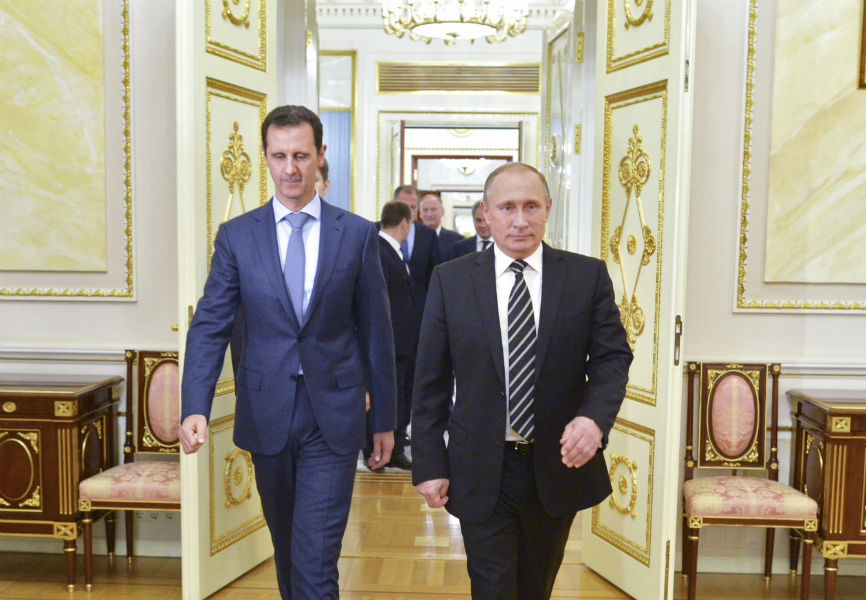Early this week, protesters gathered in the southern Syrian city of Daraa to protest the construction of a statue of President Bashar al Assad's father and predecessor, Hafez Assad, which was toppled eight years ago at the outbreak of Syria's civil war in March 2011. The war is now entering its final stages, with Assad and his international allies steadily regaining control over most of the country. Here are five things you need to know about the bloody conflict.
1. Incredible devastation: half of population displaced
Since the beginning of the war, between 400,000 and 470,000 people have been killed and half of the population has been displaced. The economy has been reduced to rubble and networks and institutions destroyed. The magnitude of the devastation has meant that, from 2011 to 2016, the cumulative losses in gross domestic product (GDP) have been estimated at $226 billion, about four times Syria's 2010 GDP, according to the World Bank. The war has destroyed any type of social fabric that could have helped the country to unite again and created the largest refugee crisis in modern times. Lastly, the conflict has brought the destruction of landmarks at cultural heritage sites such as the ancient city of Palmyra, the Umayyad Mosque of Aleppo, and the al Omari mosque of Daraa.
2. Refugees scattered across Middle East, Europe
According to data compiled in 2017 by the Pew Research Center, 6.3 million displaced Syrians remained in their country, 3.4 million were in Turkey, 1 million in Lebanon, 660,000 in Jordan, 530,000 in Germany, 250,000 in Iraq, 130,000 in Egypt, 110,000 in Sweden, and 50,000 in Austria. A smaller number were in North America: 54,000 in Canada and 33,000 in the US.
3. The winners are Assad, Iran, and Russia
Assad's regime is retaking areas of the country it had lost to extremist groups or rebel outfits, and the incremental withdrawal of US troops from Syria will eventually provide more space for Assad to expand in the east. Iran and its ally Russia will exercise the most foreign influence in Syria. Tehran has provided ample military support to the regime, helping put a stop to an incipient process of regime change, and then allowing the regime to go on the offensive. Russia's air support has proved vital in shifting the balance of power in the conflict. Its military has been active in Syria since 2015, and its diplomatic protection is key to Assad's survival.
4. Saudi, and also Iranian, expansionism has been curbed somewhat
In its first five years, the Syrian war became a proxy conflict between Saudi Arabia and Iran. But Russia's intervention changed the dynamics and forced Iran and Saudi Arabia to moderate their policies. More recently, Iran has managed to fend off pressures to withdraw back to its natural borders, and that is a concrete victory; however, Russia wants to curb Iran's role in Syria, which it sees as counterproductive to a final settlement of the conflict. Countries of the region have begun to normalize relations with Syria and are shifting their foreign policy stances; this includes Saudi Arabia's new efforts to mend relations with Assad's regime following the success of a joint Emirati-Egyptian push to do the same.
5. Western powers will rely on economic leverage to shape political process
Russia and the US will likely play a key role in defining the political settlement in the country, but the post-conflict order will still be led by the current Syrian regime. Iran will maintain a foothold in the country, but its influence will probably decline in the coming years, as part of the deal sponsored by Russia. Regional powers will continue to moderate their positions on Assad and are increasingly willing to trust Russia to deliver on the agreement to end the conflict. The US is no longer interested in remaining active in Syria but will use economic leverage to shape the political settlement. Pledges to support Syrian refugees inside the country or in host countries have been continuously delivered on. At a joint EU-UN conference in Brussels on 14 March, about 50 countries pledged to provide a record $6.97 billion. However, reconstruction will not be possible without an international political settlement legitimizing Assad's military victory. Until a political solution is reached, and US and EU sanctions are lifted, it will be difficult for US companies and European companies to get involved.

 Bashar al Assad and Vladimir Putin are emerging as winners from the conflict. REUTERS.
Bashar al Assad and Vladimir Putin are emerging as winners from the conflict. REUTERS.